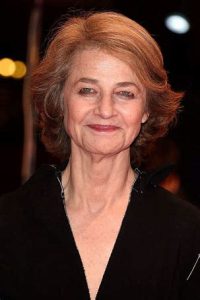Charlotte Rampling, the daughter of a British colonel, embarked on a life’s journey marked by cultural transitions and artistic exploration. At the tender age of nine, her family’s relocation to Fontainebleau initiated her immersion into French culture, where she began learning the language at a local school. Upon returning to England, the teenage Charlotte ventured into music hall performances alongside her sister, briefly embracing a career in modelling. In a manner akin to contemporaries like Jane Birkin and Jacqueline Bisset, her cinematic debut occurred in the iconic film of London’s swinging sixties, “The Knack… and How to Get It” (1965). Subsequently, she found herself in the spotlight of successful comedies while honing her dramatic skills at the Royal Court School.

However, a profound personal tragedy, the sudden loss of her sister, propelled Charlotte to make a life-altering decision. Relocating to Italy, she encountered a pivotal figure in her career, Luchino Visconti, who cast her in the 1969 film “The Damned.” Early on, Charlotte Rampling displayed her fearlessness as an actress, gracefully transitioning from the science fiction realm of “Zardoz” (directed by John Boorman) to the provocative universe of “The Night Porter.” It was this latter film, directed by Liliana Cavani in 1974, that introduced her to a wide audience. In “The Night Porter,” she portrayed a Holocaust survivor engaged in a complex relationship with her former tormentor.
Eager to explore the most intricate facets of the human psyche through her roles, Charlotte Rampling even played the role of a woman in love with a chimpanzee in Nagisa Oshima’s “Max, Mon Amour” (1985). Her enigmatic charm resonated with American audiences, leading to collaborations with distinguished directors like Woody Allen in “Stardust Memories” (1980), Robert Mitchum in “Farewell, My Lovely,” and Sidney Lumet in “The Verdict,” where she assumed the role of a femme fatale.
In the late 1970s, she decided to make France her home and continued her film career, working with directors such as Yves Boisset in “Un Taxi Mauve,” Claude Lelouch in “Viva la Vie!” and Jacques Deray in the 1985 thriller “We Only Die Twice.” The year 2001 saw her receiving an honorary César award, recognizing her exceptional career. Unwavering in her commitment to the art of acting, Charlotte Rampling continued to excel in comedy (“Kiss Whoever You Want,” “Perfect Disagreement”), thrillers (“Lemming”), arthouse cinema (“Heading South,” 2006), and Hollywood entertainment (“Basic Instinct 2”).
In 2011, while under the direction of her son Barnaby Southcombe, Charlotte Rampling became the subject of a documentary titled “The Look,” which made its debut at the Cannes Film Festival, marking yet another chapter in her illustrious career.
